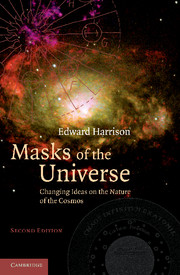Book contents
- Frontmatter
- Contents
- Prefece
- 1 Introducing the Masks
- Part I Worlds in the Making
- Part II The Heart Divine
- 8 Dance of the Atoms and Waves
- 9 Fabric of Space and Time
- 10 What Then is Time?
- 11 Nearer to the Heart's Desire
- 12 The Cosmic Tide
- 13 Do Dreams Come True?
- Part III The Cloud of Unknowing
- Bibliography
- Index
10 - What Then is Time?
Published online by Cambridge University Press: 27 October 2009
- Frontmatter
- Contents
- Prefece
- 1 Introducing the Masks
- Part I Worlds in the Making
- Part II The Heart Divine
- 8 Dance of the Atoms and Waves
- 9 Fabric of Space and Time
- 10 What Then is Time?
- 11 Nearer to the Heart's Desire
- 12 The Cosmic Tide
- 13 Do Dreams Come True?
- Part III The Cloud of Unknowing
- Bibliography
- Index
Summary
Everything is spread out in time. Things stretch away into the recent past as recalled in our memories and newspapers, and into the distant past as recounted by historians and geologists. They also stretch away into the near future as anticipated in our plans and foretold by fortune tellers, and into the distant future as predicted by geologists and astronomers.
Say no more of time! If you want a peaceful mind go no farther. Every step in quest of understanding time leads to greater bewilderment. Much of the problem is that our languages inadequately express our experiences of time.
“What, then, is time?” asked Augustine of Hippo in the Confessions. “If no one asks me, I know what it is. If I wish to explain what it is to him who asks me, I do not know.” He viewed time as a continuous temporal sequence from the past to the future, from Creation in the beginning to Judgment in the end. Time thus displays a historiography ordained by either God, fate, or natural law. This is much the same as our present commonsense general view. It caused him much perplexity, some of which is expressed by Austin Dobson in The Paradox of Time:
Time goes, you say? Ah no!
Alas, Time stays, we go.
Some of the problem is easily stated: Nothing displayed in time can change! If you think of time in terms of space, as an extension, a sort of one-dimensional space, with everything displayed in it, such as birthdays, anniversaries, holidays, then everything has its fixed moment in time and cannot possibly change.
- Type
- Chapter
- Information
- Masks of the UniverseChanging Ideas on the Nature of the Cosmos, pp. 163 - 172Publisher: Cambridge University PressPrint publication year: 2003

